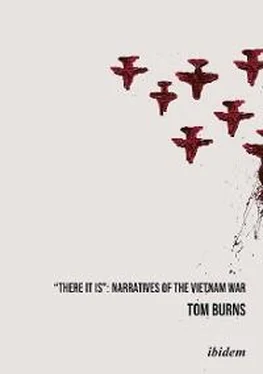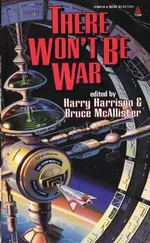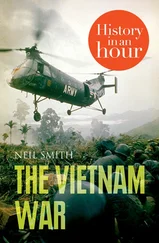Another important aspect, not only of the Vietnam War but of any war, is how the novel shows that the “truth” about what actually happens depends upon who controls the interpretation. When Fowler asks the French lieutenant in command of the Foreign Legion unit to which he attaches himself how much longer the battle will last, the lieutenant replies: “This is just a diversion. If we can hold out with no more help than we got two days ago, it is, one may say, a victory” (54).
The journey Fowler takes, which is unauthorized and therefore the first important departure from his stance as an uninvolved reporter, wakes him up to the reality of the military situation as well as its human costs. When the soldiers have to cross the canal, it is so clogged with the bodies of people who had been caught in a crossfire that the punt becomes stuck. Fowler’s description is revealingly non-journalistic: “I am reminded now of an Irish stew containing too much meat. The bodies overlapped: one head, seal-grey, and as anonymous as a convict with a shaven scalp, stuck up out of the water like a buoy” (50-51).
These experiences gradually undermine Fowler’s resolve to remain aloof, and yet he is aware that the moral indignation that has moved him to act against Pyle has personal, legal, and political implications—he will have to dissimulate with Vigot, whom he likes, and aid the Viet Minh, whom he does not know. Because of this moral dilemma, political readings have generally been less important in the vast critical literature that has accumulated around the novel than might be expected. According to Jim Neilson, a Marxist critic who analyzed the critical reception of The Quiet American over several decades, readings of the novel have moved “from a defense against charges that Greene was anti-American and a focus on existential and Christian themes to a recognition of Greene’s prescience and an interest in his race and gender constructions.” 52All these thematic emphases, according to Neilson, have obscured the political meanings. It is to be expected that criticism of a major writer’s fiction would try to make connections among his various works—hence, the obsessive critical concern with existentialist choice and the dark side of Greene’s moral universe—but Neilson is surely right to be impatient with the critical insistence on such readings in the post-Vietnam climate, where the political (and moral) issues of American intervention are so relevant.
One notorious political reading was the first film adaptation by Joseph Mankiewicz (1958), filmed in Saigon, which altered certain details, as well as the ending of the novel, to make the story more suitable to Cold War sensibilities. For example, when Fowler reads the book before his window—the signal to go ahead with Pyle’s murder—he reads a passage from Othello (rather than Kipling, as in the novel), to suggest that his motive is jealous revenge rather than moral indignation at Pyle’s political activity. And at the end of the film, Vigot proves to Fowler that Pyle was innocent of the bombing; it was really perpetrated by the Communists. 53
Greene was unsurprisingly angry at this willful distortion, as were the British reviewers of the film, but Mankiewicz offered no apologies, even claiming that Fowler was one of those “ice-blooded intellectuals…whose intellectuality is really just a mask for completely irrational passion,” 54which makes nonsense not only of the character but of his moral dilemma in the novel. The distortion of the novel’s politics is not confined to conservative interpretations, according to Neilson, who complains that even liberal political readings of the novel “have continued to read American foreign policy as well-intentioned,” 55which is most likely due to the liberal politics of most literary critics. In Neilson’s Marxist reading, American policy in Vietnam was not the result of well-intentioned but misguided innocence (as he claims even Greene seemed to think), but “a logical and necessary means of maintaining capitalist hegemony.” 56Neilson cites Haim Gordon’s book on Greene to support an interpretation in which The Quiet American can be seen as exposing the horrors perpetrated by the US government “in its greed and lust for power,” and how these horrors have been “instigated, supported, and covered up by the western powers.” 57What seems clear, in any event, is that as long as the Vietnam War inspires the writing of fictional works and provokes both literary and political debate, Greene’s seminal novel will be at the center of these discussions.
iii. William J. Lederer & Eugene Burdick, The Ugly American (1958)
The Ugly American was a best-selling novel (four million copies) later adapted into a less successful homonymous film (1963), starring Marlon Brando and directed by George Englund. 58Lederer and Burdick’s work is essentially a polemical argument worked up into fiction. “This book is written as fiction; but it is based on fact,” the authors claim in an introductory note, a statement that might apply to almost any work of fiction, although it usually means to signal the present work’s serious intentions. The authors were Asian experts rather than professional writers of fiction. When the book was published, Lederer had been special assistant to the Commander-in-Chief, Pacific Fleet, while Burdick was an academic specialist in Southeast Asia at the University of California, Berkeley. 59Despite these impressive credentials, their novel is at the same time politically naïve and a true reflection of Cold War thinking. Jim Neilson claims that the authors evidently held “the belief that simple American know-how can overcome revolutionary political movements that arose from dire socioeconomic problems and the cruel legacy of colonialism.” 60
As a literary effort, The Ugly American is far inferior to Greene’s novel or, for that matter, all the other novels discussed in this chapter, but as a cultural document it is revealing of the political climate of the period on which it had considerable influence. John Kennedy, planning to run for the presidency on an anti-Communist foreign policy platform, was one of four senators who gave copies of the novel to their colleagues, evidently to alert them to the dangers of Communism in Asia and the hitherto inadequate efforts of the US government to stem the red tide. 61Lt. Col. John Vann, a later adventurer in Vietnam both as soldier and civilian—he is the subject of Neil Sheehan’s biography-history of the war, A Bright Shining Lie (1988)—read and approved of the novel. Vann also said that he hoped to emulate Landsdale, who had arrived in Vietnam eight years earlier, in his own work there. Vann believed that Landsdale, unlike the inept “ugly Americans” of the novel, really “understood” Asians.
According to Sheehan, The Ugly American , whose title is an obvious play on Greene’s (and possibly meant to “correct” Greene’s view of Vietnam), “was accepted well into the 1960s as an example of serious political thought,” an assessment reflected in the novel’s reception, both popular and critical. 62The historian Joseph Buttinger was one of the few critics who—in a detailed, fifty-page review in Dissent (Summer 1959 issue)—discussed the book’s inanity, distortions, and falsehoods. 63Neilson thinks that Buttinger went to such lengths because he believed that the novel had too much influence on contemporary foreign policy debates. Schulzinger has made an even greater claim for the book’s influence on foreign policy: “as political propaganda setting the stage for a war, The Ugly American had an impact similar to that of Harriet Beecher Stowe’s Uncle Tom’s Cabin in the years before the American Civil War.” 64Like Stowe, Lederer and Burdick seem certain that God was on their side, and, as a corollary, the enemy (Communism) was both godless and ruinous.
Читать дальше












